Cold or Allergy? How to tell the difference
We all have that moment when the sniffles strike – and you start hedging your bets on whether it's because of a cold or allergies. The signs can be similar, making it tricky to tell them apart1.
Despite the overlap in symptoms, there are a few ways to identify whether an allergy or cold is the root cause. It's important to know these differences between allergies and colds so that you can find the best method of relief.
In this article, we'll explain:
- Allergies vs cold
- It's probably a cold if...
- It's probably allergies if...
- Allergies and cold symptoms checklist
- How to treat a cold
- How to treat allergies
Allergies vs cold
The main difference between colds and allergies is what causes them:
- A cold is caused by a viral infection entering your body2
- Allergies are your immune system reacting to substances (allergens) like pollen or pet dander3.
Viruses can strike all year round – though they’re generally more common in cooler weather between September and April4. Allergies, on the other hand, typically work on more of a seasonal basis5.
Some pollens are more prominent at different times of the year, which can trigger hay fever. Meanwhile, allergens like dust or pet dander are more likely to affect you during autumn and winter when you spend more time indoors5.
So, if you seem to get a cold at the same time every year, it could be your body reacting to a specific allergen7.
It’s probably a cold if…
The exact symptoms of a cold may vary from person to person or depend on the strain of virus that causes your symptoms8. Generally, the symptoms of a common cold can include:
05.png
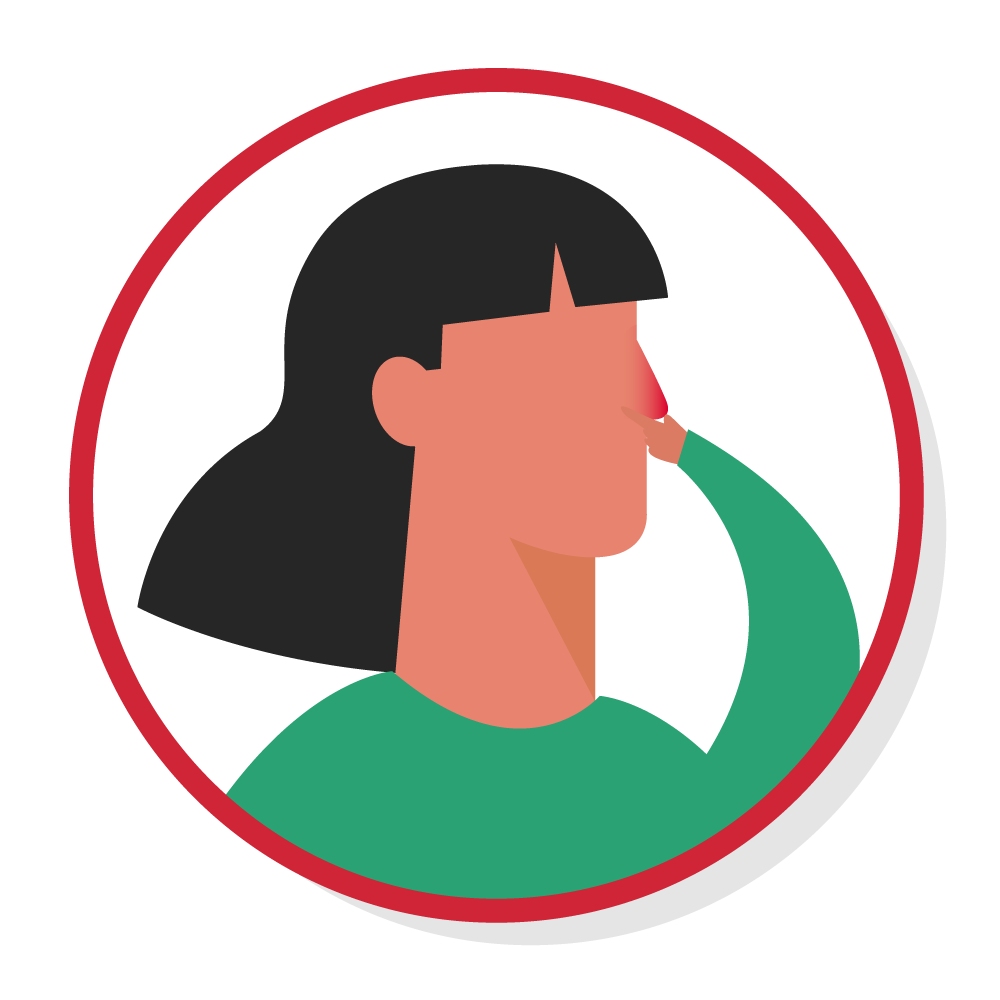
- Stuffy, blocked or runny noses
- Sneezing
- Coughing9.
Of course, some of these cold symptoms can crop up when you have allergies too. With a cold, you may also get more severe symptoms, such as:
04.png
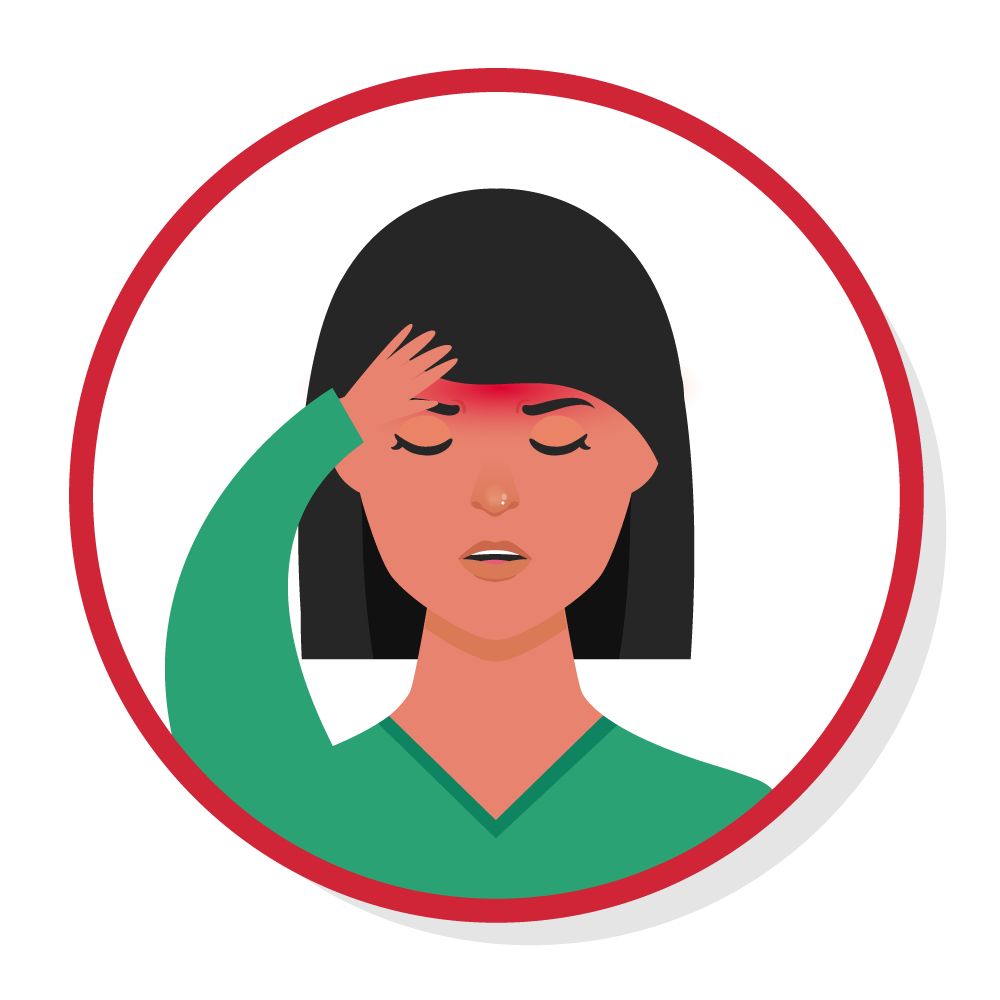
- Body aches
- Fatigue
- Weakness
- A fever.10
These symptoms are rare with an allergic reaction and more common with a cold, so they can often be the deciding factor when working out which one it is11.
A change in your mucus
You may also notice changes in the colour and thickness of the mucus from your nose with a cold12. Typically, as your body fights an infection like the common cold, your mucus will become thicker13.
It may also turn a yellow, green or cloudy colour because of the increased waste and higher level of white blood cells your body pushes out as part of your immune response14.
A progression of your symptoms
If your symptoms change every few days rather than staying consistent, you're more likely to have a cold than an allergy15. With a cold, your symptoms will vary and progress as the infection takes hold, then again as your immune system starts to fight it off16.
For example, you might start with a blocked or runny nose. This may develop into a sinus headache as your immune response starts to cause swelling in your nasal passages, before the symptoms begin to ease17.
It’s probably allergies if…
While allergy symptoms often mimic those of a cold, there are a few tell-tale signs to help you spot the difference between an allergy and cold.
Just like when you get a head cold, you're likely to get a blocked or runny nose and start sneezing when experiencing an allergic reaction18 .
But there are also a few symptoms that are more common with allergies. These can include:
06.png
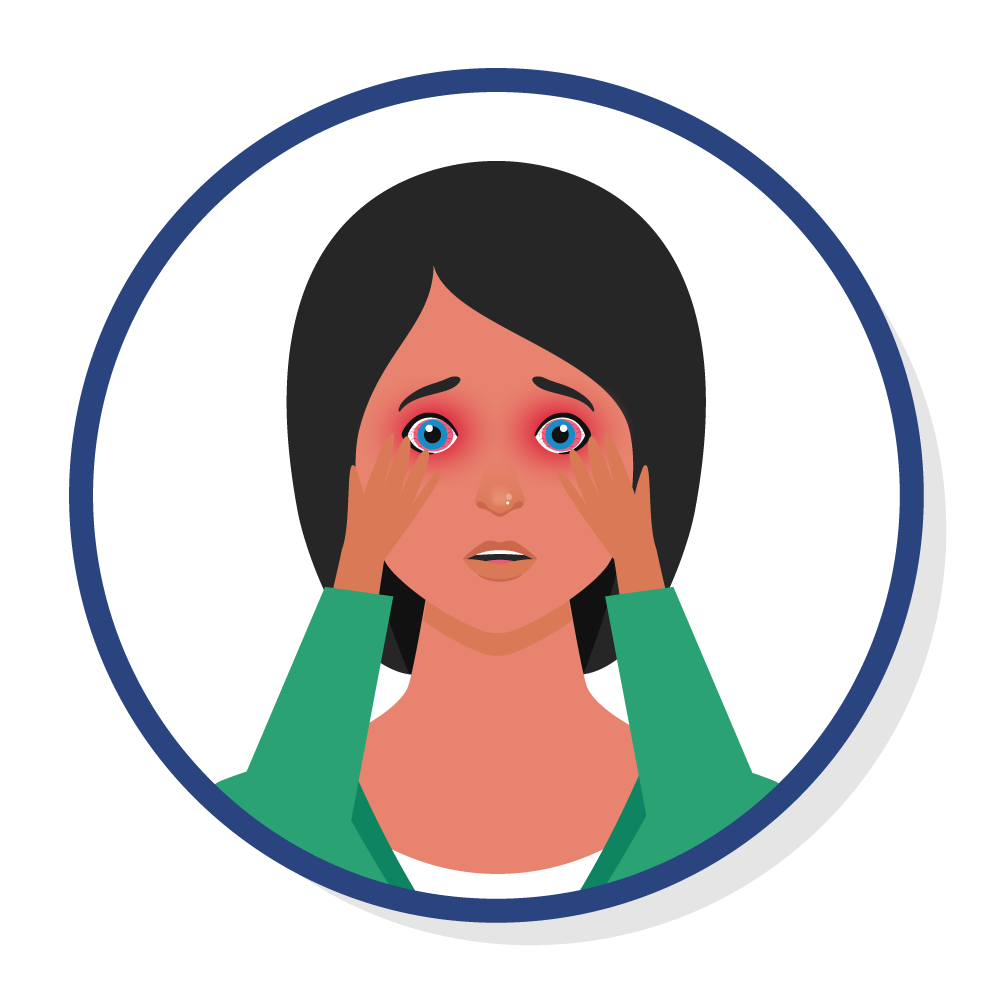
- Itchy or watery eyes
- Itching skin
- Rashes
- Red rims around the eyes19.
Clear or watery mucus
With allergies, your body isn't fighting any germs or producing more white blood cells. As a result, the mucus from your nose will still be clear and reasonably thin20.
Consistent symptoms
While your cold symptoms will change as your body fights the viral infection, allergy symptoms usually remain pretty consistent21.
It lasts longer than a week
Most colds should clear up in around seven to 10 days. If your symptoms lasts any longer, it could be signs of an allergy.
Should your symptoms last for several weeks, it could be that you're experiencing a reaction during peak allergy season22 .
Your symptoms recur in certain situations
If you notice your symptoms start developing at around the same time every year, it's probably allergies23. This is because certain pollens and allergens are more prevalent at specific times of the year24.
For example, if you're allergic to grass pollen, you're more likely to get symptoms from May to August25. Or, if you start sneezing every time you sit with your sister's new cat the chances are that you're allergic to it26.
Allergies or cold symptoms checklist27
Wondering what your symptoms mean? Use our symptom checklist below to help you work out whether you have a cold or allergies.
|
|
|
Rarely |
|
|
|---|---|---|---|---|
| Cold | Cough, sneezing, runny nose, sore throat, stuffy nose | General aches and pains, fatigue and weakness, fever | Itchy eyes | |
| Allergy | Itchy eyes, sneezing, runny nose, stuffy nose | Cough, fatigue and weakness | Sore throat | Fever, General aches and pains |
How to treat a cold
If you have a cold, your immune system should successfully get rid of the infection in around a week28. But that doesn't mean you have to put up with uncomfortable symptoms until it does.
You can do several things to help ease cold symptoms, like a stuffy nose or sinus headache.
Pain relievers
If your cold causes aches and pains, you can take over-the-counter pain relief like ibuprofen or paracetamol. Just make sure any other medication you’re taking doesn't also contain paracetamol or ibuprofen29.
Decongestants
SUDAFED® Blocked Nose & Sinus Capsules can help ease some of the symptoms of a cold, such as a stuffy or blocked nose and sinus headaches30.
The active ingredient pseudoephedrine hydrochloride works to reduce the swelling in your nasal passages, helping you breathe more easily through your nose31.
bnand_sinus_tablets.png
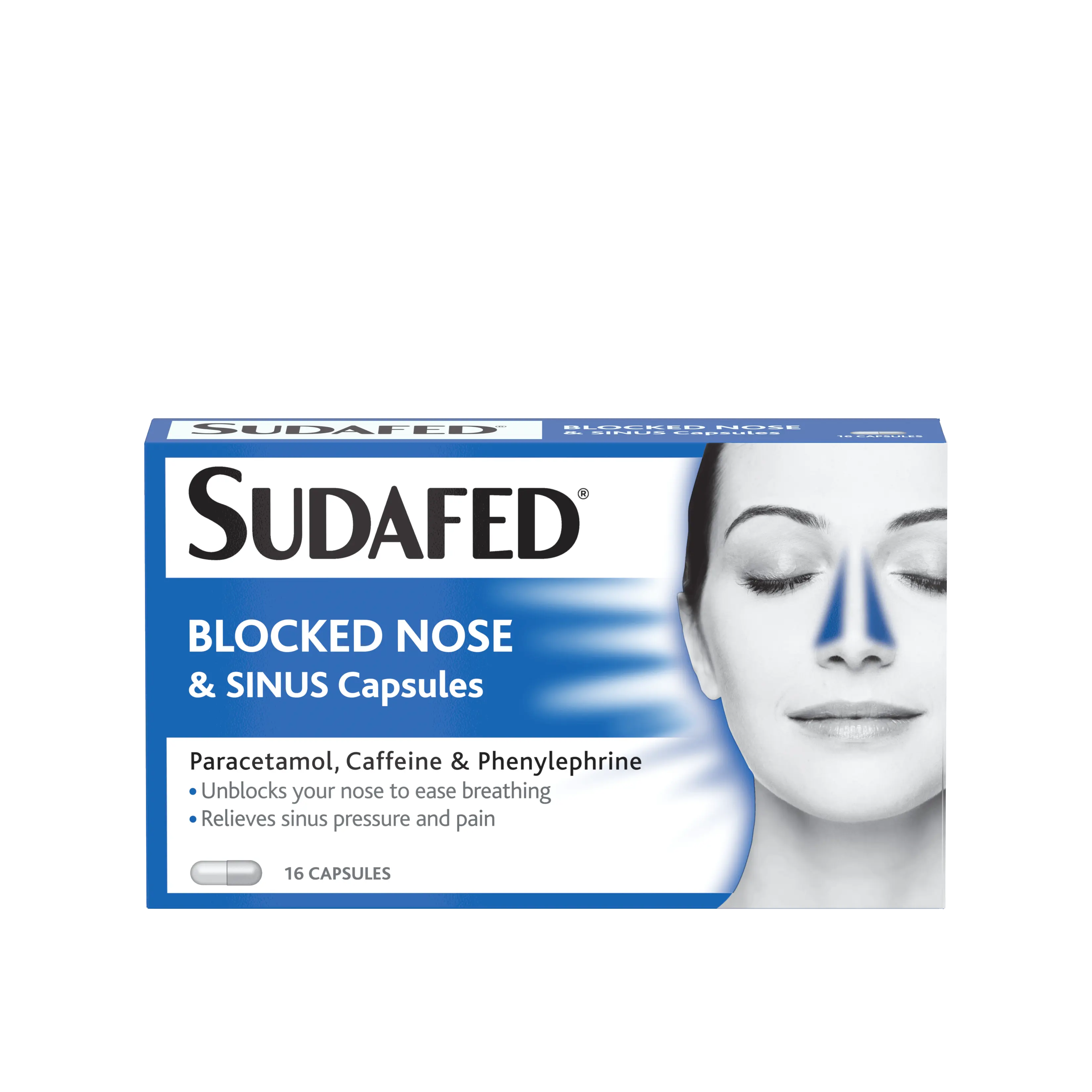
Get plenty of rest
Your body needs time to fight the infection and heal itself32. A few days of rest can help with this, especially if you feel worn out and fatigued.
Stay hydrated
Drinking plenty of water can help loosen thick mucus and encourage it to drain out of your nose33. It should also reduce the chance of dehydration, which can help you feel better too34.
How to treat allergies
One of the most effective ways to ease and prevent any allergy symptoms is to avoid your triggers altogether35. Of course, that might not always be possible.
Instead, try and reduce your exposure as much as possible. Limit time outside during allergy season, wash after encountering any known allergens and protect your eyes from pollen with wraparound sunglasses36.
There are also several allergy medications you can try to help ease your symptoms.
Antihistamines
Antihistamines block the histamines produced by your immune system in response to an allergen38. In doing so, they help combat some of the symptoms such as stuffiness and a blocked nose39.
If taken in advance, they can also help prevent future allergic reactions40.
Decongestants
Like antihistamines, decongestant medications can reduce nasal swelling and inflammation to help you breathe through your nose more easily41.
By reducing the swelling, mucus can drain from your nasal passages and relieve much of the pressure in your sinuses42. Because they work to unblock your nose, you can use decongestants as both an allergy and a cold medication.
decongestant_tablets.png
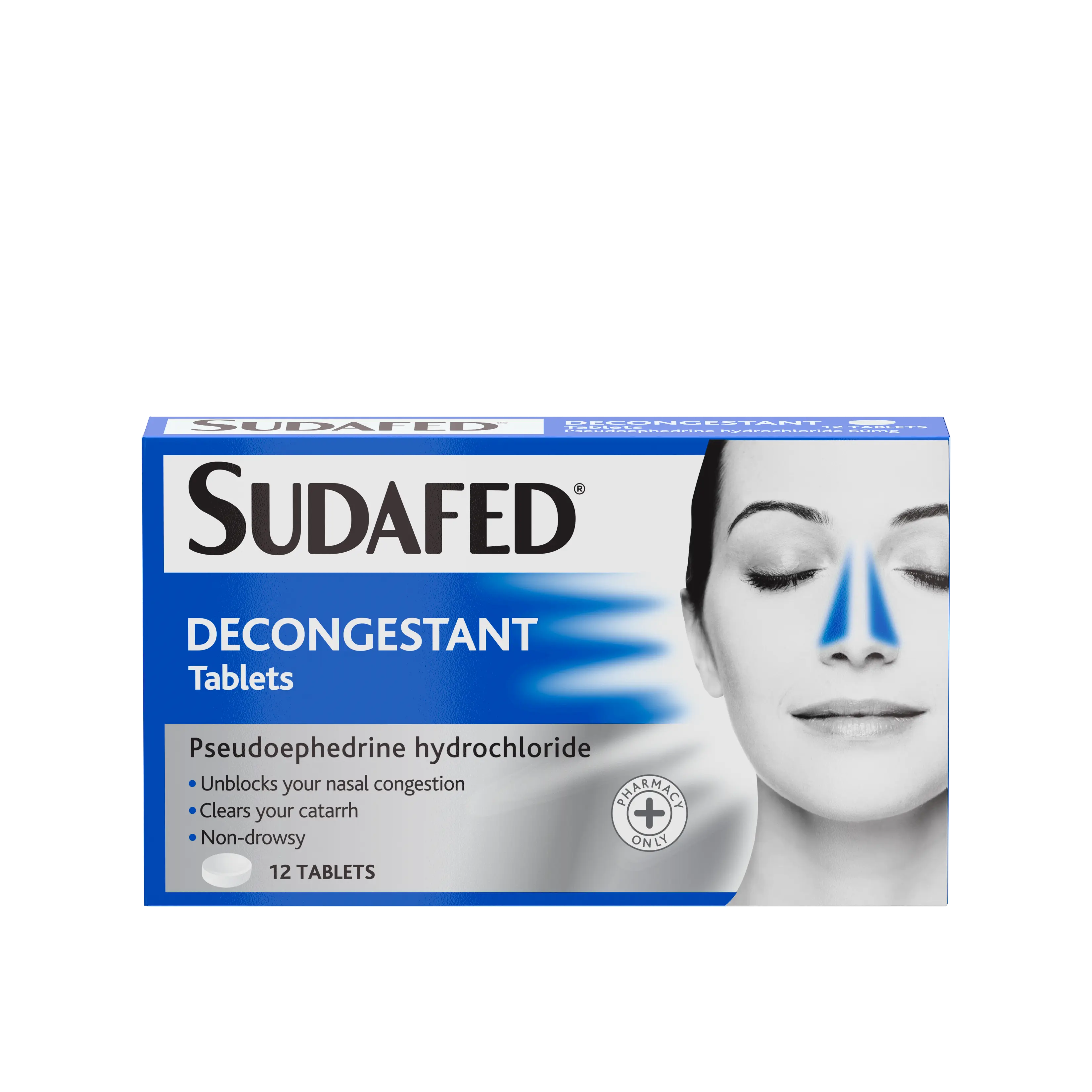
Immunotherapy
If your allergies are severe, your doctor may suggest you have immunotherapy. This is where you’re gradually exposed to increasing doses of an allergen to help your body build up an immunity43.
Frequently asked questions
Can you have a cold and allergies at the same time?
Yes. Allergies and colds have different causes and they can happen at the same time. Usually, though, you’ll recover from a cold much faster than allergies44.
Back to topDo antihistamines work on colds?
Yes. Some types of antihistamines can help relieve common symptoms of a cold, including a runny nose and sneezing45.
Antihistamines block the histamines produced by your immune system that cause your nose to itch and swell46.
Not all antihistamines are proven to help cold symptoms though. Those that might include:
- Brompheniramine
- Chlorpheniramine47
References
1 https://www.healthline.com/health/allergies/allergies-or-cold
2 https://www.healthline.com/health/allergies/allergies-or-cold
3 https://www.healthline.com/health/allergies/allergies-or-cold
4 https://www.verywellhealth.com/when-is-common-cold-season-770443
5 https://www.healthline.com/health/allergies/allergies-or-cold
6 https://www.healthline.com/health/allergies/seasonal-allergies
7 https://kidshealth.org/en/parents/seasonal-allergies.html
8 https://www.webmd.com/allergies/sinus-nose-tool/allergies-or-cold?page=2
9 https://www.mayoclinic.org/diseases-conditions/common-cold/expert-answers/common-cold/faq-20057857
10 https://www.mayoclinic.org/diseases-conditions/common-cold/expert-answers/common-cold/faq-20057857
11 https://www.mayoclinic.org/diseases-conditions/common-cold/expert-answers/common-cold/faq-20057857
12 https://www.webmd.com/allergies/sinus-nose-tool/allergies-or-cold?page=2
13https://www.webmd.com/allergies/sinus-nose-tool/allergies-or-cold?page=2
14https://www.webmd.com/allergies/sinus-nose-tool/allergies-or-cold?page=2
15https://www.webmd.com/allergies/sinus-nose-tool/allergies-or-cold?page=2
16https://www.webmd.com/allergies/sinus-nose-tool/allergies-or-cold?page=2
17https://www.webmd.com/allergies/sinus-nose-tool/allergies-or-cold?page=2
18https://www.mayoclinic.org/diseases-conditions/common-cold/expert-answers/common-cold/faq-20057857
19https://www.nhs.uk/conditions/allergies/symptoms/
20https://www.webmd.com/allergies/sinus-nose-tool/allergies-or-cold?page=1
21https://www.webmd.com/allergies/sinus-nose-tool/allergies-or-cold?page=1
22https://www.webmd.com/allergies/sinus-nose-tool/allergies-or-cold?page=1
23https://www.webmd.com/allergies/sinus-nose-tool/allergies-or-cold?page=1
26https://www.webmd.com/allergies/sinus-nose-tool/allergies-or-cold?page=1
27https://www.mayoclinic.org/diseases-conditions/common-cold/expert-answers/common-cold/faq-20057857
28https://www.healthline.com/health/allergies/allergies-or-cold
29https://www.mayoclinic.org/diseases-conditions/common-cold/in-depth/cold-remedies/art-20046403
30https://www.mayoclinic.org/diseases-conditions/common-cold/in-depth/cold-remedies/art-20046403
31https://www.sudafed.co.uk/products/decongestant-tablets
32 https://www.sudafed.co.uk/products/decongestant-tablets
33 https://www.mayoclinic.org/diseases-conditions/common-cold/in-depth/cold-remedies/art-20046403
34https://www.mayoclinic.org/diseases-conditions/common-cold/in-depth/cold-remedies/art-20046403y
35https://www.healthline.com/health/allergies/allergies-or-cold
36https://www.nhs.uk/conditions/allergic-rhinitis/treatment/
37https://www.webmd.com/allergies/understanding-eye-allergies
38https://www.healthline.com/health/allergies/allergies-or-cold
39https://www.nhs.uk/conditions/allergies/treatment/
40https://www.nhs.uk/conditions/allergies/treatment/
41https://www.healthline.com/health/allergies/allergies-or-cold
42https://www.sudafed.co.uk/products/decongestant-tablets
43 https://www.nhs.uk/conditions/allergies/treatment/
45https://www.webmd.com/cold-and-flu/cold-guide/decongestants-antihistamines-cold
46https://www.webmd.com/cold-and-flu/cold-guide/decongestants-antihistamines-cold
47https://www.webmd.com/cold-and-flu/cold-guide/decongestants-antihistamines-cold
Back to top

